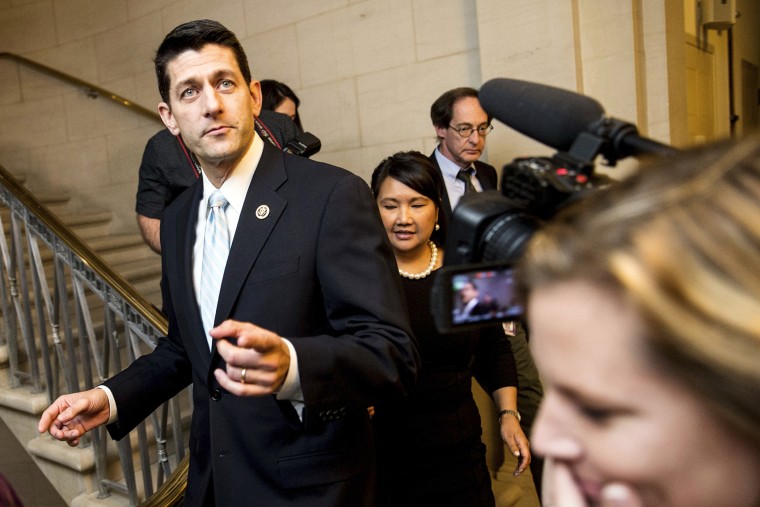Press a Republican politician on his or her opposition to Syrian refugees, and they'll eventually point to the vetting process that's currently in place. Most GOP lawmakers, governors, and candidates have no interest in endorsing explicit bigotry, instead saying they have concerns about the rigor of the screening process refugees must go through. Some on the right like to pretend the process
doesn't even exist.
The trouble comes when pressed for policy details or any kind of substantive analysis. The
New York Times reported today:
When pressed, most Republicans could not specify which aspects of the rigorous refugee vetting program that they found inadequate. [House Speaker Paul Ryan's] staff members cited a Bloomberg poll of 1,002 adults released on Wednesday, conducted by Selzer & Company, that found that 53 percent of those surveyed said the resettlement program should be halted.
Of all the domestic coverage I've seen this week about U.S. politicians and their reactions to Paris, this might be my favorite paragraph to date. Republicans know they have a problem with the vetting process, but they have no idea why.
And when House Speaker Paul Ryan -- a celebrated "wonk," according to much of the media -- was asked about his concerns, his office pointed to, of all things, a poll.
In other words, Americans who have no real understanding of the rigorous refugee vetting program are leading elected policymakers, whose job it is to know better. The new Republican Speaker can't identify actual problems with the vetting system, but Ryan can stick his finger in the air, read a poll, put together a meaningless "
task force," and tell his party to ride the wave of panic whether it makes sense or not.
Talking to reporters this week about the terrorism in Paris, the Wisconsin lawmaker
argued, "It's clear this was an act of war, and that the world needs American leadership."
It is, to be sure, a nice sentiment, but what the Speaker didn't say is what he thinks "American leadership" looks like in this situation. Does it mean Congress voting to authorize a military offensive against ISIS? For the last year and a half,
the answer has been no. Does it mean Congress voting this afternoon on an anti-refugee bill, which is exactly what ISIS wants to see? According to Paul Ryan, the answer is yes.
On the other side of Capitol Hill, the picture is equally discouraging. The
Huffington Post reported yesterday:
In the aftermath of the Paris terrorist attacks, Senate Democrats on Wednesday criticized Republicans for blocking national security nominees who would help fight terrorism and track Islamic State militants. [...] Adam Szubin, who has bipartisan support, has been waiting more than 200 days to be confirmed as the Treasury Department's under secretary for terrorism and financial crimes. The job involves tracking terrorists to prevent them from raising money on the black market and elsewhere. Szubin's nomination got a hearing before the Senate Banking Committee on Sept. 17, and Chairman Richard Shelby (R-Ala.) praised his past work in countering terrorist financing during his time with both Republican and Democratic administrations.... But Szubin's nomination hasn't moved since. There's no clear reason why, beyond trying to make it difficult for President Barack Obama to fill administration posts.
Republicans have also
slow-walked qualified nominees to serve as Secretary of the Army and the head of the U.S. Agency for International Development, not because GOP senators have concerns about the officials up for confirmation, but rather because Republicans reflexively object to President Obama's nominees for anything.
